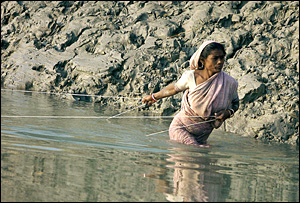 | A woman pulling a prawn fishing net from the mud embankment on the Matla river, in the Sundarbans delta.
DESHAKALYAN CHOWDHURY/AFP/Getty Images |
Winners and Losers
part 1 2 3 4
Prawns in Bangladesh
by Lucy Ash, BBC Current Affairs
My guide here today on this chilly morning is Morshed Ali Khan of the Daily Star newspaper. We've come along because we're trying to find some fry collectors. They're the people who've stretched their nets all the way along this riverbank and they're hoping to catch some fry or baby prawns. We're at the gateway to the Sunderbans, the world's largest coastal mangrove belt. They stretch all the way down here south to the Bay of Bengal. We've stopped here now to talk to an old woman who's hunched over a small bowl. She's up to her knees in mud. Her name is Noor Jihan.
There's a stiff breeze blowing.
She came very early morning. She says it's very cold out here. She collects this bowl full of water.
Ms. Jihan has wrinkled hands. She collects water in an aluminum pot, then sifts through it with a mother of pearl shell. She's shivering in the cold.
This water is so muddy and murky. I don't know how she can see anything in it. How much does she earn doing this?
She sold her fry yesterday for 10 taka. [About fifteen cents.]
Continue to part 2
| 






